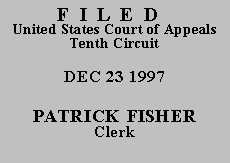

| ULISES TESORO,
Petitioner-Appellant, v. STATE OF COLORADO, Respondent-Appellee. |
|
Petitioner, who has at all relevant times been represented by counsel, seeks review of the district court's order denying his petition for habeas relief under 28 U.S.C. § 2254. In this case, there are two preliminary considerations which determine if petitioner can proceed on appeal.
We first consider whether petitioner waived appellate review by failing to object to the magistrate judge's recommendation. On September 22, 1994, the magistrate judge filed his recommendation. On October 20, 1994, petitioner filed a pro se motion for appointment of new counsel. Noting petitioner's failure to file objections to the recommendation, the district court denied the habeas petition and motion for appointment of counsel on October 25, 1994. On January 7, 1997, petitioner filed a motion for a ruling on the habeas petition, stating that he had never received a copy of the recommendation. The district court sent petitioner a copy of the magistrate judge's recommendation and the district court's order denying the petition. Upon petitioner's motion, the district court later entered judgment denying the petition.
This court has "adopted a firm waiver rule when a party fails to object to the findings and recommendations of the magistrate." Moore v. United States, 950 F.2d 656, 659 (10th Cir. 1991). Failure to object to the magistrate judge's report and recommendation results in waiver of appellate review, unless the ends of justice dictate otherwise. See id.
In this case, petitioner argues the ends of justice preclude enforcement of the waiver rule because he did not receive copies of either the magistrate judge's recommendation or the district court's order. Although the recommendation indicates that it was served on petitioner, see 28 U.S.C. § 636(b)(1) (requiring service of recommendation by mail on parties for ten-day time period for filing objections to commence running), in the interests of justice we will assume that petitioner did not receive notice of the recommendation, and has cause for failing to file objections. We therefore decline to dismiss this appeal under the waiver rule.
Also, before we will consider the merits of an appeal, petitioner must secure a certificate of probable cause from this court, pursuant to 28 U.S.C. § 2253.(1) Based upon our review of the record as a whole, we conclude that petitioner has failed to make a substantial showing of the denial of a constitutional right. See Barefoot v. Estelle, 463 U.S. 880, 893 (1983); Lennox v. Evans, 87 F.3d 431, 434 (10th Cir. 1996), cert denied, 117 S. Ct. 746 (1997), overruled in part by United States v. Kunzman, 125 F.3d 1363, 1365 n.2 (10th Cir. 1997).
We, therefore, DENY a certificate of probable cause and DISMISS the appeal.
Entered for the Court
Circuit Judge
*. This order and judgment is not binding precedent, except under the doctrines of law of the case, res judicata, and collateral estoppel. The court generally disfavors the citation of orders and judgments; nevertheless, an order and judgment may be cited under the terms and conditions of 10th Cir. R. 36.3.
1. Petitioner has failed to make an express request for a certificate of probable cause. His notice of appeal is deemed to represent such a request. See Velarde v. Shulsen, 757 F.2d 1093, 1096 (10th Cir. 1985).
Because petitioner filed his habeas petition before enactment of the Antiterrorism and Effective Death Penalty Act of 1996 (AEDPA), Pub. L. No. 104-132, 110 Stat. 1214, AEDPA's certificate of appealability requirements do not apply to this appeal. See United States v. Kunzman, 125 F.3d 1363, 1364 & n.2 (10th Cir. 1997). Instead, the pre-AEDPA certificate of probable cause requirements apply here. Regardless of the label we attach to the requirements, petitioner's substantive burden is the same, see Lennox v. Evans, 87 F.3d 431, 434 (10th Cir. 1996), cert. denied, 117 S. Ct. 746 (1997), overruled in part by Kunzman, 125 F.3d at 1365 n.2.